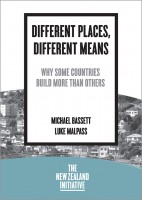Wellington (12 September 2013): Would-be home owners don’t have to resign themselves to ever increasing house prices according to the latest research from the New Zealand Initiative, which found three overseas markets who are getting it right. In brief, the research found: In Germany and Switzerland, where the right to build is entrenched and local government funding is linked to population growth, house prices were stable but high; In Texas, where projects outside of zoned municipal areas are run by private developers, house prices had been maintained at a low level for an extended period; and Britain’s planning system, which shares many attributes with New Zealand, has delivered housing shortages, steep house price inflation, and smaller, more urban dwellings. Read more





